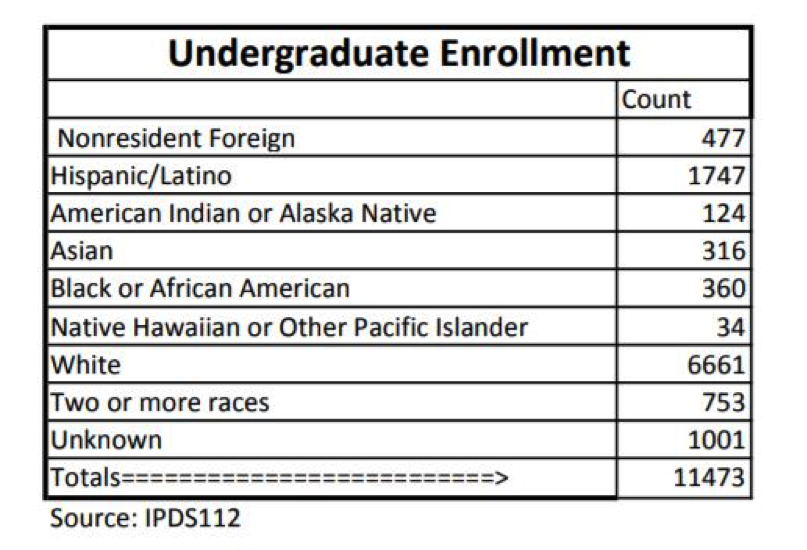Examining EWU’s smallest ethnic group on campus
May 31, 2018
In the rainy, dreary days of spring in Cheney, it’s hard to imagine a place more different than the warm, sandy beaches of Hawaii and the Pacific Islands. Yet 34 Hawaiian and Pacific Islander students call Cheney, and EWU, home.
Out of 11,473 students at EWU, 42 percent identify as a non-Caucasian ethnicity. By far, the smallest ethnic group on campus is the Hawaiian and Pacific Islander group, with only 34 total students as of 2017.
Grace Hendricks, one of the few Hawaiian students on campus, provided some insight as to why there are so few Hawaiians and Pacific Islanders on campus.
“There may be so little because, no offense, but Cheney is kinda country if you know what I mean,” Hendricks said. “I think that a big reason for people in Hawaii or other Pacific Islanders leaving their home is because they want to experience something new. A packed city like Seattle would seem like it would attract people because it’s so different.”
Hendricks, a computer science major, began attending EWU in 2016. She came to Cheney from her hometown of Kaulia on the island of Oahu because she’d heard that Washington was very similar to Hawaii in many ways, something she soon discovered wasn’t entirely true. While Hendricks cites the weather and the food as being very different, the biggest difference she discovered was the lack of community.
“Because everyone lives in such close proximity with each other [on Oahu], you are kind of forced to get along despite your differences,” said Hendricks. “It kind of feels like a giant community, whereas here [at EWU] there are a lot of really nice people but everyone kinda has their own lives. People sometimes feel cold and not as willing to accept people who are different.”
Hendricks plans on returning to Hawaii to finish school after this year is finished.
“I came up here last year and had a really difficult time,” said Hendricks. “I missed my family and kinda felt like an outsider because of how different everything is here. I guess it was a completely different culture and lifestyle that I wasn’t accustomed to.”
One significant problem Hendricks acknowledged on campus for Hawaiian and Pacific Islander students is a lack of information.
Pui-Yan Lam, a professor of sociology and associate dean at EWU, is doing her best to change that.
“I feel like there’s a lack of awareness about the experiences of Asian-Americans and Pacific Islanders on campus and in the USA,” Lam said.
Both Lam and Hendricks acknowledged the need for better education about Pacific Islanders and Hawaiians on campus.
“It’s kinda crazy to me how little mainlanders know about our heritage and culture,” said Hendricks. “Especially as someone who has been asked silly questions about Hawaii that I honestly don’t mind answering, but because Hawaii is a part of the United States it should be known as more than just the place where Pearl Harbor happened. I even had my roommate last year tell me that if I didn’t like it in America then I should just go home to Hawaii, which was hilarious but also kinda horrifying.”
Currently, EWU hosts a handful of cultural and diversity classes. Students are required to take at least one to graduate. These classes include African-American, Chicano, Latino, Indian, and Asian-American studies, but nothing exists for Hawaiian or Pacific Islander histories. EWU even offers minors in cultural programs, such as African Studies.
“These [Hawaiian and Pacific Islander] students are here, but unfortunately we don’t have those programs for them,” Lam said.
In 2016, Lam organized EWU’s first Asian-American and Pacific Islander Heritage Month, a nationally recognized heritage month taking place in May.
Many people are aware of Black History Month, both in America and on campus, Lam said, but not many people know about AAPI month.
“We hope that we might be able to bring Asian American and Pacific Islander students together,” said Lam, on why she organized AAPI month on campus. “Hopefully we’ll be able to reach out to new students.”
This year’s activities included a Luau at the beginning of the month, and a special Asian American and Pacific Islander graduation ceremony at the end of the month.









Natasha Guerrero • Jun 1, 2020 at 12:31 pm
I came looking for a Pacific Islander group at EWU. I am an online student so being able to learn and share my experiences virtually is essential. Although this article is from 2018, I do think it’s important to highlight the lack of awareness of Pacific Islanders. I am from Guam, a U.S. Territory and identify as Chamorro. Like Hendricks stated, many people from the Pacific Islands migrate to the mainland in hopes for a better future to support their family back on the island and to experience a new life beyond the island . I do wish that EWU has more intentional conversations with and about the smallest population on their campus. I hope that people are willing to learn about Pacific Islander culture.